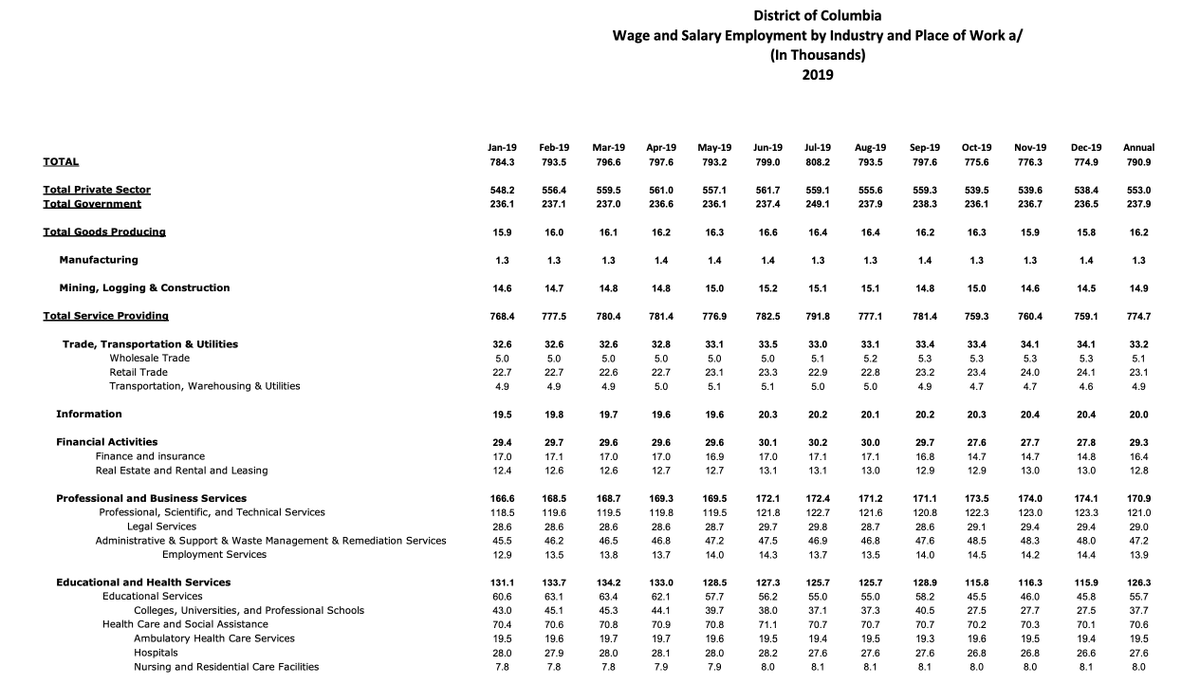This is one of those things that often feels true but only because it’s a caricature. DC's actual labor statistics reveal a more complicated picture. https://twitter.com/frankthorp/status/1276237968810917889
Here’s the 2019 breakdown by industry of DC-based employees, according to the Department of Employment Services: https://does.dc.gov/sites/default/files/dc/sites/does/publication/attachments/2019%20District%20of%20Columbia%20%28Monthly%20Data%291.pdf
Government workers, a category that includes both state and federal employees, clock in at roughly 238,000.
Keep in mind this figure also counts 4,300 workers in “public transportation.” I guess you could make an argument for some of them being bureaucrats, but not all.
Keep in mind this figure also counts 4,300 workers in “public transportation.” I guess you could make an argument for some of them being bureaucrats, but not all.
By contrast, private sector employees outnumber public sector employees by more than 2 to 1.
But wait! you say. Aren’t the vast majority of those lobbyists and lawyers? K Street hangers-on?
Not so fast.
Not so fast.
According to the data, “legal services” accounts for 29,000 workers. If you lump them in with all “professional, scientific and technical services,” you get a total of 121,000.
That, plus the 238,000 government workers gets you to 359,000, about 49.7 percent of DC’s total estimated population of 706,000. (Source: https://www.census.gov/quickfacts/DC )
Now, turning to other industries.
Two categories account for more than 208,000 workers: Education and health services, and leisure and hospitality.
That’s nurses, bartenders, teachers, artists — you know, the real people who make up a city. That’s 29 percent of DC.
Two categories account for more than 208,000 workers: Education and health services, and leisure and hospitality.
That’s nurses, bartenders, teachers, artists — you know, the real people who make up a city. That’s 29 percent of DC.
That’s not all. Add in manufacturing, another 1,300. Mining, logging and construction? Almost 15,000. The financial sector, 29,300. Trade and utilities: 33,000. Religious, grantmaking and similar groups, 68,000.
You’ve just hit 50.1 percent of DC.
You’ve just hit 50.1 percent of DC.
Now, could Cotton be *technically* right? Sure. “White-collar” is a pretty broad label. Conceivably it would mean lumping in all those financial and real estate professionals in with those slimy ~bureaucrats~ and voila, you’ve found “the largest group” of workers in DC.
But something tells me that’s not who Cotton really means when he refers dismissively to Washington “industries.” Nor should he!
It’s true that the policymaking apparatus in Washington has many tentacles that extend beyond the actual levers of government that you learn about in Schoolhouse Rock. They include think tanks and astroturf groups, and the so-called "revolving door."
But it is *also* the case that DC has many residents who are not a part of that apparatus, and it’s inaccurate to portray Washington monolithically as a place where only swampy officials live.
To learn more about what DC is really like, please turn to some of the city’s best local news sources, including
@wamu885
@DCist
@WTOP
@PoPville
@Eater_DC
@wamu885
@DCist
@WTOP
@PoPville
@Eater_DC
And @ggwash! Can’t forget them, too.

 Read on Twitter
Read on Twitter



